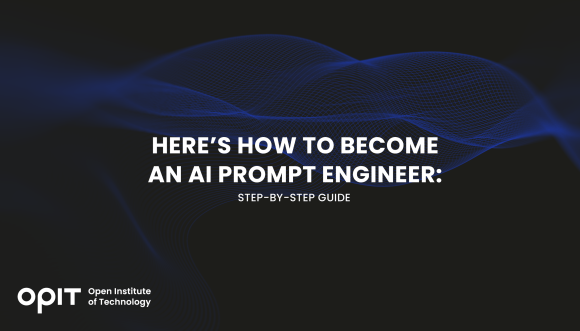Artificial Intelligence (AI) is the talk of the town (or the globe). It is currently leading the charge in tech advancements in almost every sector, from healthcare to customer service. The advancement of AI has also brought new roles along with it, chief among them that of an AI prompt engineer—a career at the confluence of AI innovation and human creativity. This guide will show you how to join this cutting-edge field, where technical prowess meets linguistic flair and psychological insight.
Here’s how to become an AI prompt engineer.
What Is an AI Prompt Engineer?
AI prompt engineers translate and bridge the gap between human curiosity and AI’s massive knowledge base. They construct the behind-the-scenes questions or “prompts” that ask AI systems in a way that the machine’s response gives just the right result.
Imagine asking an AI about the best way to make a pizza, and instead of getting a recipe, you end up with a history lesson on tomatoes. You don’t have to be precise with your imagination because AI prompt engineers to step up, tweak, and fine-tune the prompts to lead the AI toward understanding the question.
These engineers also help interpret the AI’s responses and refine those prompts based on accuracy and relevance. They teach it how to understand not just words but the intent behind them. It’s what makes AI conversations feel more natural and less like you’re talking to a textbook.
AI prompt engineers are at the forefront of bridging the gap between human intentions and AI’s capabilities. They observe and train the AI models to grasp and respond to human languages more effectively.
Essential Skills and Qualifications
For this role, one must cultivate a blend of technical, creative, and analytical skills. The following are essential for any aspiring AI prompt engineer:
- Python. This lingua franca of AI development is necessary for any AI prompt engineer. You should have a solid grasp of this language for coding and for leveraging AI frameworks and libraries for developing and refining AI models.
- Natural Language Processing (NLP). As a merge between linguistics and computer science, it’s the heart of what makes AI systems understand and generate human language. Knowledge of NLP principles and technologies enables AI prompt engineers to make prompts that make sense to the AI.
- Creative touch. While you can’t necessarily learn the skill, it’s still fairly essential and leads to prompts that are clear to the AI and engaging or meaningful to humans. You must find novel ways to communicate with AI to achieve sought-after outcomes.
- Machine learning. You will also need a fundamental understanding of this field of study. Engineers use it to fine-tune AI models and improve their responsiveness and accuracy using feedback loops from real-world interactions.
AI prompt engineer is a very new job title, so it isn’t quite yet a distinct traditional academic path. Still, many paths can lead to this career.
- Computer science gives you a broad foundation in programming, algorithms, and data structures, technical skills necessary for AI development.
- Linguistics may not seem like a major to lead into a tech job. Still, it gives insights into the structure and function of language for understanding and improving AI’s language processing.
- Cognitive science bridges the gap between human psychology and computer science. It can show you how a machine can mimic (or fail at mimicking) human thinking.
- AI and machine learning programs, as a whole, focus directly on the technologies behind AI, which are the foundation for an AI prompt engineer.
Check out OPIT degrees
-
Career aligned
-
Fully Online
-
EU-accredited institution
Path to Becoming an AI Prompt Engineer
So, how to become an AI prompt engineer, then? Now that you understand what skills you need and what degrees might be the best, let’s see how to get there.
- Pursue a bachelor’s or master’s degree in fields that lay the groundwork for a career in AI, like computer science, linguistics, cognitive science, or AI and machine learning. You’ll get the theoretical basics and technical skills to get the human and computational parts of AI prompt engineering.
- Look for internships where you can work on actual AI projects. Try personal projects or contribute to open-source AI. Such projects can be related to anything you enjoy. Doing so is fun and lets you experiment and innovate with AI technologies. Moreover, others, including possible employers, will get an idea about your skills.
- Never stop learning. Take part in workshops, enroll in online courses, and get as many certificates in AI, NLP, and machine learning as you can.
- Take part in the AI community through forums, social media groups, and conferences. When you’re a part of a group effort, you get to learn and grow along with the community and get your name out.
- Take time to reflect on your learning and projects. Be open to exploring new areas of AI that interest you, and don’t be afraid to change your focus as you discover what excites you the most about AI prompt engineering and what might miss the mark for you.
OPIT’s Programs in AI and Machine Learning
OPIT’s educational program lineup offers several pathways to becoming an AI prompt engineer—the MSc in Responsible Artificial Intelligence, the BSc in Modern Computer Science, and the MSc in Data Science & AI. These degrees give you all the skills you need to tackle AI prompt battles and victories.
The heavy-duty content covers everything from the basics to the brain-bending advanced topics. Once you know the theory, you will also get the practice of project-based learning that takes you out of the classroom (figuratively, since you might still physically be in one). Hands-on learning segments plunge you into real-world AI development.
By the time you’re done, you will be theoretically proficient and have experience in applying AI in various scenarios, including the nuanced art of prompt engineering. For example, you might have to refine an AI’s ability to understand and generate human-like. Or, you might develop prompts that take an AI through complex ethical dilemmas.
Check out OPIT degrees
-
Career aligned
-
Fully Online
-
EU-accredited institution
Why Choose a Career as an AI Prompt Engineer
Being an AI prompt engineer takes you straight to the front lines of AI development, where every day brings a new challenge and a chance to shape the future of how humans and machines interact. It’s a career path with immense potential for growth, innovation, and creativity. This career is ideal for tech-inclined people who want to be pioneers, a part of the bleeding-edge technology before it becomes a necessary part of everyone’s workflow.
Be at the AI Frontlines
Now you know how to become an AI prompt engineer, so it’s time to get started on this exciting career path. Focus on relevant degree programs like computer science, linguistics, or AI, and keep an eye out for opportunities for more hands-on learning – whether it’s an internship or an open source project.
While you’re mapping out your career path, let OPIT be part of the journey with programs that will set you up for success in this field. Whether it’s a bachelor’s or master’s degree, you’ll receive a comprehensive education with relevant hands-on experience from experts in the field, poised to position any aspiring AI prompt engineer for success.






